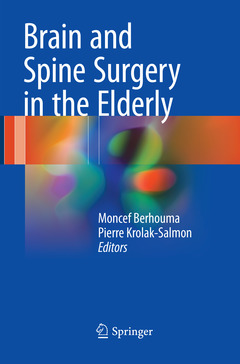Description
Brain and Spine Surgery in the Elderly, Softcover reprint of the original 1st ed. 2017
Coordinators: Berhouma Moncef, Krolak-Salmon Pierre
Language: English
Subjects for Brain and Spine Surgery in the Elderly:
Brain and Spine Surgery in the Elderly
Publication date: 08-2018
Support: Print on demand
Publication date: 08-2018
Support: Print on demand
Brain and Spine Surgery in the Elderly
Publication date: 04-2017
529 p. · 15.5x23.5 cm · Hardback
Publication date: 04-2017
529 p. · 15.5x23.5 cm · Hardback
Description
/li>Contents
/li>Biography
/li>Comment
/li>
This unique and richly illustrated volume presents the state of the art in the comprehensive management of major neurosurgical diseases in the elderly (aged 65 and over). It explores all of the common neurosurgical pathologies affecting elderly patients, and emphasizes the paramount importance of tailored management strategies for quality of life. It highlights updated techniques for anaesthesia and critical care, as well as minimally invasive neurosurgical methods intended for this specific group of patients. Radiosurgery treatment is also discussed, in particular for brain tumours.
In western societies, the proportion of elderly citizens has nearly reached 20%, and shows no signs of slowing down. The management of neurosurgical conditions in this particular population requires specific multidisciplinary strategies. To address this situation, a team of internationally respected contributors accurately describe degenerative and traumatic spinal diseases, which account for the majority of admissions among the elderly, as well as brain tumours and intracranial haemorrhages, aspects that are raising new ethical issues.
The book mainly addresses the needs of neurosurgeons and geriatric neurologists, but also neuro-oncologists and neuro-anaesthesists working with elderly patients, as well as students in these disciplines.
FOREWORD
Michael APUZZO – University of Southern California (USA)
PREFACE
Epistemology and rationale of geriatric neurosurgery
Moncef BERHOUMA - Lyon University Hospital (France)
PART 1 – NEUROLOGICAL ASSESSMENT OF THE ELDERLY
Chapter 1. Physiology of the ageing nervous systemMoncef BERHOUMA - Lyon University Hospital (France)
Chapter 2. Neurological assessment and neurocognitive evaluation of the elderly
Pierre KROLAK-SALMON - Lyon University Hospital (France)
PART 2 – NEUROANESTHESIA AND CRITICAL CARE
Chapter 3. Neuroanesthesia of the elderly
Andrew William KOFKE – University of Pennsylvania (USA)
Chapter 4. Perioperative neurotoxicity in the elderlyRoderic ECKENHOFF – University of Pennsylvania (USA)
PART 3 – INTRACRANIAL TUMORS
Chapter 5. Intracranial meningiomas
David SCHUL – University of Munich (Germany)
Chapter 6. Brain gliomas
François DUCRAY – University of Lyon (France)
Chapter 7. Pituitary adenomasPaolo CAPPABIANCA – University of Naples (Italy)
Chapter 8. Vestibular schwannomas
Michael LINK – Mayo Clinic, Minnesota (USA)
Chapter 9. Brain metastases
Moncef BERHOUMA - Lyon University Hospital (France)
Chapter 10. CNS Lymphoma
Andreas HOTTINGER - University of Lausanne (Switzerland)
PART 4 – SPINAL PATHOLOGIES
Chapter 11. Degenerative cervical spine
Christian EWALD – University of Jena (Germany)
Chapter 12. Degenerative lumbar spine
Christian EWALD – University of Jena (Germany)
Chapter 13. Spinal injuries of the elderlyMichael FEHLINGS – University of Toronto (Canada)
Chapter 14. Vertebral tumors of the elderlyEdward BENZEL – Cleveland Clinic (USA)
Chapter 15. Intramedullary spinal cord tumors
George JALLO – University of Baltimore (USA)
Chapter 16. Intradural extramedullary spinal tumors
Richard FESSLER – University of Chicago (USA)
Chapter 17. Spinal infections
Hideki NAGASHIMA – University of Tottori (Japan)PART 5 – HEAD INJURY
Chapter 18. Traumatic brain injury in the elderly
Andrea KLEINDIENST- University of Erlangen (Germany)
Chapter 19. Chronic subdural hematoma
Angelos KOLIAS – University of Cambridge (UK)
PART 6 – NEUROVASCULAR
Chapter 20. Subarachnoid hemorrhage in the elderlyMats RYTTLEFORS – University of Uppsala (Sweden)
Chapter 21. Intracerebral and intraventricular hemorrhage
Mats RYTTLEFORS – University of Uppsala (Sweden)
Chapter 22. Malignant pseudo-tumoral stroke
Eelco WIJDICKS – Mayo Clinic, Minnesota (USA)
PART 7 – HYDROCEPHALUS IN THE ELDERLY
APPENDIX
Michael A. WILLIAMS – University of Washington (USA)
PART 8 – TRIGEMINAL NEURALGIA
Raymond SEKULA – University of Pittsburgh (USA)
PART 9 – ETHICAL ISSUES IN NEUROSURGICAL ELDERLY PATIENTS
Marc BERNSTEIN - University of Toronto (Canada)
Moncef Berhouma MD, MSc is a consultant neurosurgeon at the University Hospital of Lyon (France). He is an associate professor of neurosurgery and surgical instructor at the European association of neurosurgical societies (EANS). He holds a Master of science in philosophy of neuroscience. He performed his research fellowship in the skull base surgery laboratory at Ohio University in USA (2011). He is the author of more than 50 scientific papers in peer-reviewed journals, more than 7 book chapters and 2 books. His main interests are minimally-invasive skull base surgery and geriatric neurosurgery.
Pierre Krolak-Salmon, MD, PhD is a neurologist and geriatrician at the University Hospital of Lyon (France), Director of Clinical Research Memory Centre of Lyon and of the Clinical Research Centre “Elderly, Brain and Frailty”, head of the Social Cognition and Cognitive Disorders research group at Neuroscience Center of Lyon. He completed his Neurosciences Master in 1999 and his PhD on brain dynamics of facial emotional expression recognition in 2004. He also studied at the Welcome Trust in London, UK and Johns Hopkins Hospital in Baltimore, USA. He currently has an active teaching role at the University Claude Bernard in Lyon, in the fields of geriatrics, neurology, neuroscience and neuropsychology. His main areas of research interest include biomarkers (CSF and neuroimaging) and predictors of autonomy loss in dementia; social cognition and emotion recognition; clinical neurology and geriatrics.
Explores for the first time the specific neurosurgical conditions involved with the elderly
Provides updated techniques focusing on improvements in anaesthesia and critical care for the elderly
Focuses on minimally invasive neurosurgical techniques and radiosurgery
Geared towards neurosurgeons, geriatric neurologists, neuro-oncologists and neuro-anaesthesists
© 2024 LAVOISIER S.A.S.




